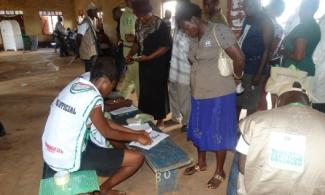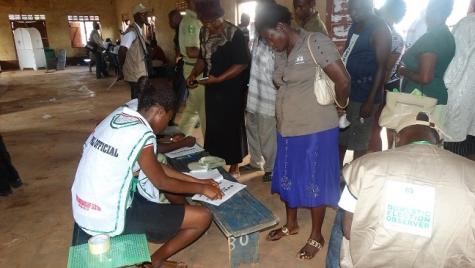

A day after hearing all the appeals challenging the conduct of Anambra State governorship election held in November last year, the Enugu Division of the Court of Appeal today adjourned for judgment.
SaharaReporters learned that the appellate court proceedings were almost aborted by some members of Judiciary Staff Union of Nigeria (JUSUN) in Enugu State who seemed determined to disrupt the panel.
Members of the union are currently on strike in state courts with those in federal courts expected to join next week. Our correspondent reports that some members of JUSUN showed up at the court premises at about 8.45 a.m. to lock up the courtroom, an action that took lawyers and a throng of party supporters by surprise.
Speaking to a correspondent of SaharaReporters, a representative of the Maxi Okwu faction of APGA accused one Alex Ejesieme, a special assistant to Governor Willie Obiano of Anambra State, of arranging the attempted disruption of the court. “Mr. Alex Ejesieme, Chief Obiano’s special assistant on tribunal matters, bribed Chinedu Mba, the chairman of JUSUN in Enugu State, to disrupt the court proceedings,” said the rival APGA official. Mr. Mba is a court clerk to the Chief Judge of Enugu State.
The source added that the strategy of Mr. Obiano’s assistant was to ensure that all the appeals before the Court of Appeal would lapse after 60 days of delivery of the judgment of the tribunal. The recently amended provisions of the 1999 constitution specify that any appeal arising from judgment of an election tribunal must be determined within 60 days after the delivery of the judgment of the tribunal or the appeal would lapse.
The attempt to disrupt the proceedings was averted when officials of the court of appeal called in police officers to block the union members, who subsequently left the court premises.
The proceedings then commenced at 9.30 a.m. when the justices, Mohammed Lawal Garba, Ejembi Eko, Olufemi Akeju, Tijani Abdullahi and Mohammed Mustapha, took their seats.
The first appeal called for argument was that of Senator Chris Ngige of the All Progressive Congress (APC) against the Independent National Electoral Commission, Governor Obiano and APGA. Mr. Ngige’s lead counsel, Oluwarotimi Akeredolu, urged the court to take note of the difference between his client’s appeal and the case of Akeredolu versus Mimiko (in which he was a petitioner and lost). He pointed out that, in the Akeredolu case, the tribunal, court of appeal and Supreme Court all found as a fact that there were unlawful injections of 146,000 names in the voter register used in the Ondo State election by INEC, but held that if the number is deducted from 260,199 votes scored by Mimiko, it would not be enough to upset the election. However, in the Anambra election, INEC admitted that it tampered with the voters’ register less than three days before the election, thereby violating the electoral act, which provides that the registration of voters, updating and revision of the register of voters shall stop not later than 60 days before any election. Mr. Akeredolu argued that by contravening this provision INEC conducted the election without a valid voters’ register thereby rendering the outcome of the election a nullity.
He cited several authorities to support his claim that, where an election is conducted with an invalid voters register, a petitioner would not be required to prove the effect of such breach in the votes scored by the parties. He urged the court to annul the Anambra election and order a fresh election.
Responding to his submission, INEC’s legal team, led by its Director of Legal Services, Mr. Ibrahim Bawa, urged the justices not to annul the election as the commission’s breach of Section 9 (5) of the Electoral Act and other breaches were not substantial enough to call for nullification. He cited the provisions of Section 139 (1) of the Electoral Act which provides that an election shall not be liable to be invalidated by reason of non-compliance with the provisions of the Act if it appears to the election tribunal that the election was conducted substantially in accordance with the principles of the Act and that the non-compliance did not affect substantially the result of the election.
In their own arguments, counsel to Obiano and APGA, Onyechi Ikpeazu and Patrick Ikwueto, whose briefs of argument were filed out of time, echoed the argument advanced by INEC’s counsel, urging the court to sustain Mr. Obiano’s election.
After listening to all the submissions, the appellate court panel reserved delivery of judgment to a date to be communicated to the parties.
The court also heard arguments in separate appeals filed by Tony Nwoye of PDP and Chike Obidigbo of the Maxi Okwu faction of APGA.
The justices also reserved judgment in those cases to a date to be communicated to the parties.